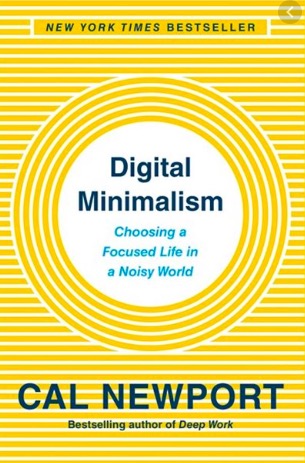Cal Newport’s book about minimizing screen time convinced me to do less in the digital universe
Call me a convert.
I casually picked up Digital Minimalism, thinking, maybe, just maybe, I might possibly think about reducing my screen time next year. And thanks to Newport’s storytelling, fact-gathering and simple prose, I’m now a devoted digital minimalist.
As a computer science professor at Georgetown University, Newport is no luddite. He’s been experimenting with different ways to hack technology to improve productivity and study for years, as the author of Deep Work and a blogger at Study Hacks.
Drawing on stories from old-timey minimalists such as Henry David Thoreau and more modern do-lessers such as Joshua Fields Millburn and Ryan Nicodemus, Newport shows how digitally mediated relationships are no replacement for embodied experiences with other humans.
But going cold turkey doesn’t really work. Newport acknowledges that at some level, many humans are tied to their screens for income and practical tasks. And technology is designed to addict us.
“In my experience,” writes Newport, “gradually changing your habits one at a time doesn’t work well — the engineered attraction of the attention economy, combined with the friction of convenience, will diminish your inertia until you backslide toward where you started.”
But it’s possible to separate the beneficial from the blather. Arguing for a 30-day digital declutter, Newport suggests that it takes time to get clear on what we undeniably need to do online, and what’s just mindless clicking. After the cleanse, he says, it’s easier to add back the apps and online activities we simply can’t live without, while leaving the junk behind.
I’m only 10 days into my digital declutter. But it’s already clear to me how a few small changes to my digital habits could improve my life. Applying Newport’s advice, I’ve created a set of rules that will govern my online behaviour in 2020.
My 2020 digital rules
- No social media on my phone (except private Facebook messaging)
- No social media on my laptop (except LinkedIn, Facebook Message, and 2 specific Facebook groups)
- No more hate-Googling Donald Trump, Ivanka Trump, Melania Trump
- Black and white settings on my phone
I think these boundaries for my digital life will help me do more of what I really love with my screen time. I’ll continue to write book reviews at daphnegordon.com. I plan to be more active than ever on LinkedIn. And I hope to finish my novel.
I’m also planning to reinvest time in activities that don’t involve screens. That means more baking, drawing, knitting, walking (sans iPhone!) and exercising. These are all easy and enjoyable things I can do with small bits of free time, instead of anxiously picking up my phone when I don’t know what to do with myself.
Join the movement
Aren’t you just a tiny bit curious about how it might feel to be more present IRL? Read this book. It’s all about refocusing your attention on the things you enjoy in the physical universe.
Newport promises it will be worth it. You’ll rediscover activities and relationships you once enjoyed but have somehow forgotten — ever since that day you got an iPhone.
Not only that, Newport writes, no one will even notice if you stop liking their updates and pictures! I removed the Instagram, Facebook, Twitter and LinkedIn apps from my phone two weeks ago, and I can honestly say, my friends haven’t noticed my lack of passive and remote approval of their lives.
IRL is where to find me
Over the past two weeks, I’ve noticed small positive changes in my quality of life. I’ve been exercising more. I’ve been a better listener. I’ve baked cookies twice. My husband (who thinks social media is anathema) seems to like me more.
Turns out, RL isn’t half bad!

Published by